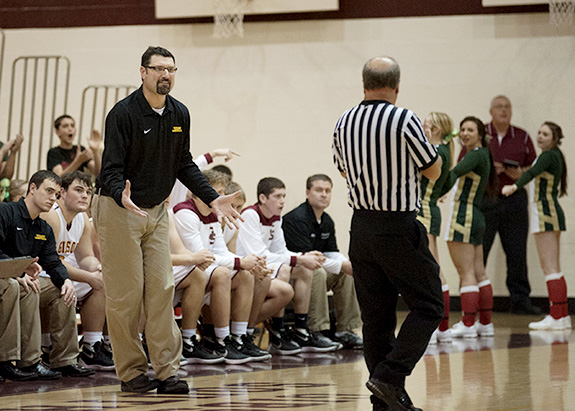Coaches Gain Professional Development by Transitioning to Referees
When Kevin Leising retired at age 55 after a successful 33-year career coaching high school basketball in Indiana, officiating was not in his plans. “Never. Not in a million years,” he says. He was ready to slow down and spend more time with his family.
But one day a friend who was an official said to him, “Kevin, if you officiate, you can still be involved, and you can set your own schedule.”
 He tried it and liked it. Now he works more than 50 games a season. That schedule consumes significant time, but not nearly as much as coaching basketball did. “It allows me more freedom,” he says. “It allows me to go see my grandkids.”
He tried it and liked it. Now he works more than 50 games a season. That schedule consumes significant time, but not nearly as much as coaching basketball did. “It allows me more freedom,” he says. “It allows me to go see my grandkids.”
Leising and others like him could be part of the solution to a problem facing athletic directors and assigners all over the country: a critical shortage of high school athletic officials.
Coaches and former coaches have the experiences, skills, and personal characteristics that make them well suited for officiating. For instance, Leising thinks his coaching background is a tremendous advantage. “If you’ve been involved with coaching, you’re obviously familiar with teenagers, you’re familiar with the competitive aspect of it, you’re familiar with being in front of large crowds,” he says. “Not everyone is comfortable with that. I am, and I think anyone who has coached would feel that way. My knowledge base in the sport is important, too. It helps me anticipate where the play may develop.”
Current coaches are also great candidates for officiating—obviously not in the sport they are still coaching, but in another sport in their off-season, maybe one they’ve coached or played in the past. A football coach who officiates track. A volleyball coach who umpires softball. A baseball coach who officiates soccer.
Todd Morgan fits this description. He coached varsity high school baseball for many years and still coaches football at Bluffton High School in Indiana, but for the past 17 winters, he has also officiated high school and college basketball. Though he has never coached basketball, his experience in coaching other sports has helped him immensely. “It helps me communicate with coaches,” he says. “I have the background of seeing it from the other side, from the coach’s point of view, and that helps me understand where coaches are coming from. It gave me an advantage early in my officiating career.”
One of the best examples of a coach who also officiated is Russ Isaacs, who successfully coached wrestling and football (state title in 1992) at Snider High School in Fort Wayne, Indiana. When he went into school administration in 1983, he had to give up coaching wrestling. He immediately transitioned into a 25-year career as a wrestling official and became one of the best, officiating in the state finals six times. “I have great respect and regard for the sport,” Isaacs says, “and I wanted to continue to be a part of it and make a positive contribution to it.”
Like Leising, he thinks his experience in the sport was a great asset. “I think you need a lot of experience in wrestling to understand how to officiate it because the sport is all about feel and understanding what’s going to happen next,” he says.
Being able to see things from a coach’s point of view contributes to, perhaps, the most important trait that coaches bring to officiating—empathy. “I have been on both sides,” Leising says. “That makes it easy for me to have empathy. I think when both sides have empathy for the other side, it’s a better relationship.”
Empathy, knowledge of the sport, effective communication skills, experience with crowds and pressure, understanding teenagers, and the role of education-based athletics — all add up to a bundle of advantages for a coach who officiates.
But if you follow in the footsteps of Leising, Morgan, and Isaacs, what’s in it for you, besides the satisfaction of addressing a dire need? For starters, you can make some money. No, it’s not going to make you rich, but it’s a good part-time job, especially if it turns out that you really enjoy it.
Officiating can also make you a better teacher and coach. “It made me a more patient coach,” Morgan says. “It made me learn how to handle situations better, and that gives me a coaching advantage. There’s always a good way to talk to officials, and I didn’t really know that until I became an official — what approach was good, what was going to help me get across what I wanted to get across.”
“Teaching-wise, it’s conflict resolution,” he adds. “You’re always going to have conflicts as a teacher — with students, with parents — and I think the more practice you get with that, the better you become. My officiating experience made me better at that aspect of teaching.”
You can also gain confidence from officiating. After coaching multiple sports for decades — and while still coaching cross country — I started umpiring baseball, and that experience has made me a more confident teacher and coach. In staff meetings, for example, I have found myself more willing to express my opinions. When you regularly displease half of the fans and participants with every controversial call, you learn to do what needs to be done and not be oversensitive to people’s reactions.
» ALSO SEE: A.D.ministration — Dealing with Wayward Fans
Moreover, learning to manage my body language — a crucial skill in officiating — has enhanced my effectiveness in dealing with people off the field. For instance, I learned from clinicians not to cross my arms or put my hands on my hips when dealing with upset coaches. I also learned to slow down my breathing in a tense situation. Those are helpful tips to keep in mind in any confrontation, whether in a boardroom or a classroom.
I have also improved my active listening skills. Coaches want to be heard, and if you don’t give them that opportunity when they are upset, there’s going to be trouble. But if you listen to them with attention and respect and patience, you can often de-escalate the situation. That works in coaching and teaching as well.
If I had never made a dime from my umpiring experience, it still would have been worth it for the interpersonal skills and confidence I have gained. And when I factor in the many great relationships I’ve formed with my fellow umpires, I consider my decision to join the officiating community one of the best I’ve ever made. If you try it, you may think so, too.





